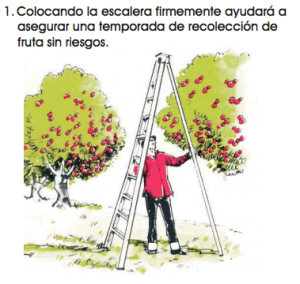
Image from FARSHA’s Safe Ladder Skills
Here in BC, people speak many different languages, so it’s important to have the right safety signs at work.
A number of organizations are making these signs available, one of which is BC’s Farm and Ranch Safety Association (FARSHA).
“Agriculture has such a cross-section of cultures,” said FARSHA’s executive director Wendy Bennett. “We always make sure we have everything in all the different languages that workers are representing.”
In 2013, FARSHA mailed out a lot of signs to people who requested them online, by phone, and in person.
Here’s how many were sent in different languages last year:
Punjabi – 463
Spanish – 204
Vietnamese – 60
French – 111
Safety in confined spaces is an important issue in agriculture – and these signs are the “hottest in demand” right now, Wendy said.
“Our field staff take them out with them on an ongoing basis because they’re always encountering confined spaces when they go out to farms,” Wendy said, describing the positive reactions they’ve been getting from farmers. “They are thrilled to get them. Depending on what type of operation people are going to, they’ll bring signs that are appropriate for them.”
And if a sign is needed – but not available – FARSHA will do custom orders for BC farmers.
“It’s come in handy when they bring in workers who speak a completely different language that we weren’t prepared for,” Wendy said. “We get the signage translated, then we make it and send it over.”
Another safety sign story caught my eye recently. A group of workers at a shake and shingle mill made their own handwritten signs in Punjabi to post alongside the English signs, according to an article on page 24 of WorkSafe Magazine’s July/August 2013 issue. WorkSafeBC backed up this effort by collaborating on a series of graphic posters that show the dangers of high-risk shake-and-shingle manufacturing activities without the use of any words at all. These signs – and many others – are available at the WorkSafeBC website.
For more information on employers’ requirements re: signage and ensuring workers understand safety training, see the WorkSafeBC Regulation online.


